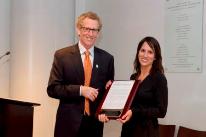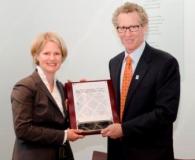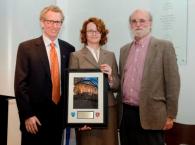On September 28, 2012, the Institute for Technology Assessment celebrated its 15th anniversary with a reception at the Paul S. Russell, MD, Museum of Medical History and Innovation. Drs. Slavin, Thrall and Gazelle warmly addressed the attendees. The Elkan Halpern ITA Career Achievement Award was presented to Pamela McMahon, PhD. Dr. McMahon joined the group as a research assistant in 1998, trained as a fellow from 2002-2006, completed her PhD and joined as a faculty member in 2006. She is currently an Associate Director of the ITA. She was promoted to Assistant Professor at Harvard Medical School in 2008 and currently serves as the Principal Investigator of the CISNET Lung Cancer Coordinating Center that is housed at the ITA.

Amy B. Knudsen, PhD received the award for best paper by an ITA faculty member, 2008-2012 for her paper titled “Cost-effectiveness of computed tomographic colonography screening for colorectal cancer in the medicare population,” which was published in the Journal of the National Cancer Institute. At the request of the Centers for Medicare & Medicaid Services (CMS), Dr. Knudsen and colleagues studied the effectiveness and cost-effectiveness of CT colonography (CTC) screening for colorectal cancer among the Medicare population. They compared CTC to other screening modalities and determined thresholds at which CTC might be cost-effective. The study has influenced CMS policy and also laid the groundwork for a subsequent funding from the National Cancer Institute. The manuscript was published in 2010 and has been cited more than 35 times by other research papers.

Alexi A. Wright, MD, MPH received the award for best paper by a trainee, 2008-2012 for her publication titled “Associations between end-of-life discussions, patient mental health, medical care near death, and caregiver bereavement adjustment,” which was published in the Journal of the American Medical Association in 2008. The manuscript examined the associations between end-of-life discussions with physicians and the medical care that terminally ill cancer patients receive. Their work showed that end-of-life discussions may have cascading benefits for patients and their caregivers, including less aggressive care, more referrals to hospice, better quality of life, and reduced caregiver bereavement. The manuscript has been cited by over 318 other research papers.
